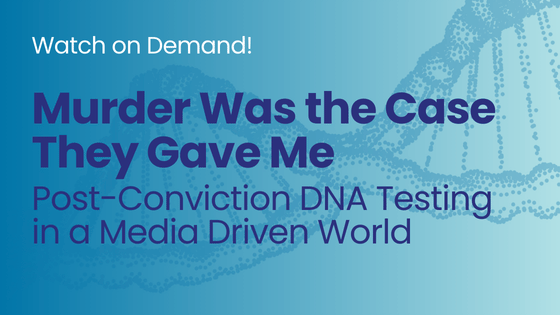The pursuit of justice does not end with a conviction. For many individuals, especially those wrongfully incarcerated, post-conviction DNA testing offers a final chance to prove their innocence. This was the powerful theme of Murder Was the Case They Gave Me: Post-Conviction DNA Testing in a Media-Driven World, a webinar featuring legal experts, forensic scientists, and advocates who shared their experiences working on wrongful conviction cases.
From legal hurdles to media influence, the webinar provided an in-depth look at the intersection of forensic DNA analysis, exoneration efforts, and the power of storytelling in securing justice.

The Power of DNA in Exoneration
Lisa Mertz, an Assistant Director in Forensic Biology at the Office of Chief Medical Examiner in New York City, highlighted how advances in DNA testing have become a critical tool in proving innocence. Mertz emphasized that many forensic units, including her own, work tirelessly to analyze DNA evidence from decades-old cases, applying new technologies that were unavailable at the time of conviction.
She underscored the importance of collaboration between forensic scientists, legal teams, and conviction review units, explaining that while DNA testing is a powerful tool, its impact depends on legal accessibility and the willingness of district attorneys to revisit old cases.
Legal Challenges: Fighting for a Second Look
Attorney Oscar Michelen provided a sobering overview of the legal roadblocks faced by those seeking post-conviction DNA testing. Michelen, who has successfully exonerated multiple wrongfully convicted individuals, detailed how inconsistent state laws, limited resources, and prosecutorial resistance make it incredibly difficult for innocent individuals to have their cases reopened.
He highlighted how groups like The Innocence Project have played a crucial role in pushing legislative reforms, such as mandatory evidence preservation laws and expanded access to DNA testing for post-conviction cases. Despite these advancements, many states still have restrictive policies, leaving exonerees trapped in a system that prioritizes finality over fairness.
The Media’s Role in Exonerations
Storyteller and filmmaker Ray Klonsky shared how media coverage can elevate wrongful conviction cases, forcing courts and district attorneys to take a second look. Klonsky’s documentary Fight for Justice: David & Me followed the case of David McCallum, who was wrongfully convicted of murder at just 16 years old and spent nearly 30 years behind bars before being exonerated.
Klonsky emphasized that in an era of true crime fascination, media exposure can serve as both an investigative tool and a pressure mechanism. Podcasts, documentaries, and in-depth journalism have increasingly contributed to case reopenings, but he warned that media coverage alone is not enough—it must be paired with strong legal advocacy and scientific evidence.
A Survivor’s Perspective: David McCallum’s Journey
One of the most powerful moments of the webinar came when exoneree David McCallum took the floor. McCallum described the emotional and psychological toll of spending nearly three decades in prison for a crime he did not commit. His story illustrated the immense barriers that wrongfully convicted individuals face, not just in securing their freedom but also in reintegrating into society.
McCallum credited forensic DNA testing, legal advocacy, and media attention for his exoneration. He also paid tribute to the late Rubin “Hurricane” Carter, a former boxer and advocate for the wrongfully convicted, whose support was instrumental in his case.
Scientific Advances and the Future of Post-Conviction Testing
Dr. Krista Currie, a forensic DNA expert, added to the discussion with a deep dive into the technological advancements that have reshaped forensic science. She explained how new methodologies, such as next-generation sequencing and forensic genetic genealogy, are allowing scientists to obtain usable DNA profiles from degraded evidence that was previously considered too compromised for testing.
While these breakthroughs are promising, Currie cautioned that forensic scientists must also navigate challenges such as evidence contamination, chain-of-custody issues, and resource constraints. She stressed the need for more dedicated funding and specialized forensic units focused solely on post-conviction testing.
Key Takeaways: Strengthening the Path to Justice
As the webinar wrapped up, a few critical themes emerged:
✅ Collaboration is key – Successful exoneration efforts require coordination between forensic scientists, defense attorneys, advocacy groups, and media professionals.
✅ Media attention matters – While legal efforts are the foundation, storytelling through documentaries, podcasts, and journalism can generate the public pressure needed to drive action.
✅ Forensic science is evolving – Advancements in DNA analysis are making it possible to reexamine decades-old cases, but systemic barriers still exist.
✅ Legislative reform is necessary – Many states still lack comprehensive post-conviction DNA testing laws, leaving countless wrongfully convicted individuals without recourse.
✅ The human impact cannot be ignored – Exonerees like David McCallum remind us that wrongful convictions destroy lives. Securing freedom is just the first step—ongoing support is critical.
Conclusion: A Call to Action
The webinar served as a powerful reminder that forensic science is not just about solving crimes—it is also about correcting injustices. With continued advancements in DNA testing, increased media scrutiny, and relentless advocacy, the hope is that more wrongfully convicted individuals will have their day in court—and their freedom restored.
For those looking to get involved, organizations like The Innocence Project and The National Registry of Exonerations provide opportunities to support post-conviction testing efforts, whether through volunteering, fundraising, or advocacy.
As forensic science continues to evolve, so too must our commitment to ensuring that justice is not just swift, but also accurate. Because in the words of David McCallum, “No one should have to fight this hard for the truth.”

